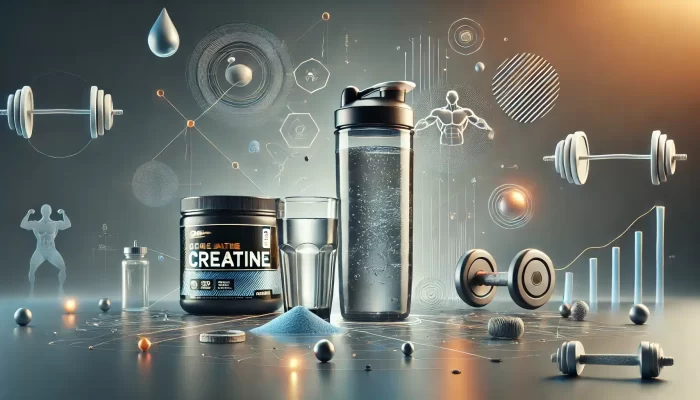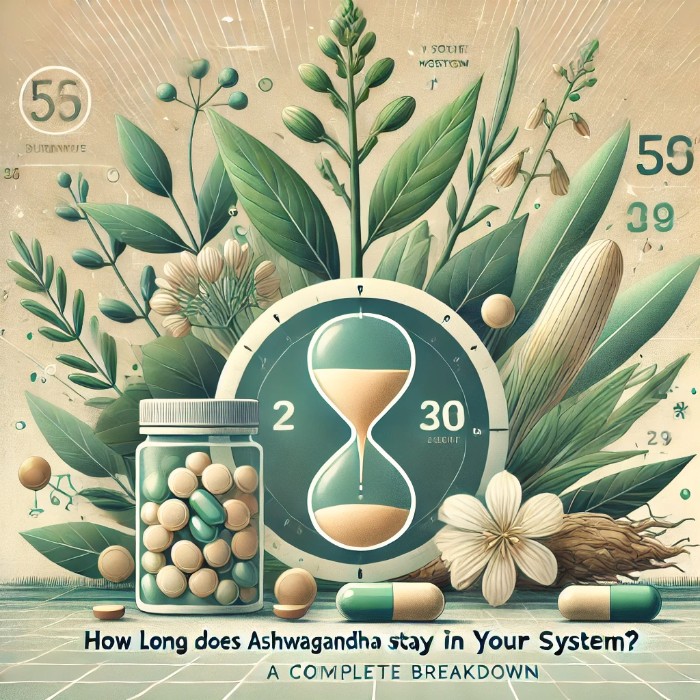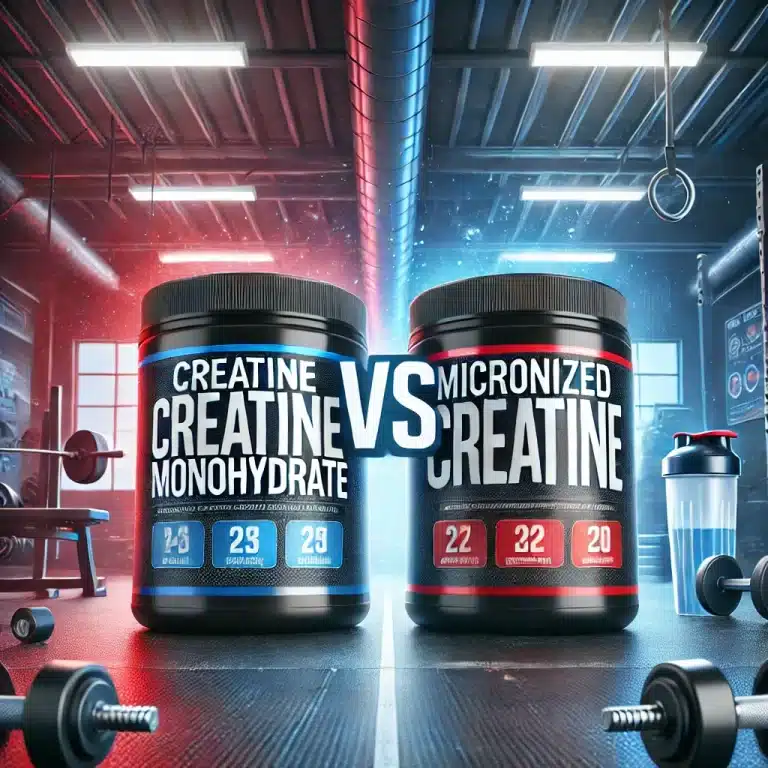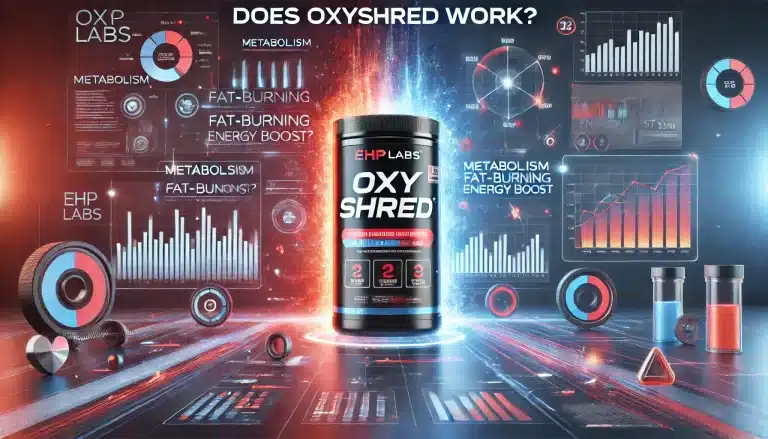How Much Water Should You Drink with Creatine?
Creatine is perhaps the most widely and well-studied supplement in the fitness and bodybuilding community. Creatine has been a go-to supplement for athletes and gym-goers alike, reputed to enhance strength and performance and increase muscle growth. But important for effective creatine use is hydration. Another question many commonly ask is: how much water to drink with creatine?
This guide explains the importance of hydration while taking creatine, how much water you should drink according to your exercise intensity and body weight, and general tips on utilizing creatine supplementation to its very highest potential.
Why Is Hydration Important When Taking Creatine?
Hydration, when taking creatine, is of utmost importance as water is involved in the absorption, effectiveness, and safety of the supplement.
It pulls water into your muscle cells, as it’s stored as phosphocreatine (which contributes to increased flux through the phosphagen energy system)Increasing volume, strength, and available energy during high-intensity workouts. Staying properly hydrated also ensures creatine just travels through your bloodstream directly into your muscles, so you can get the benefits.
The more hydrated a person is, the better shape they are in, and therefore the less likely they are to suffer adverse effects of dehydration, such as muscle soreness, bloating, or digestive issues.
Hydration also benefits overall physical performance and recovery, as dehydration compromises muscle function and performance. Hydration allows creatine to work better and keeps you healthier for longer — a win-win.
Key Roles of Water with Creatine:
Creatine supplementation is dependent upon water. Here are the main roles of water when consuming creatine:
Enhances Transport and Absorption of Creatine
Creatine will be delivered to your muscles by water entering your blood for better absorption, and storage as phosphocreatine.
Increases Hydration and Volume of the Muscle
This increase in water retention within the muscle cells enhances hydration, fullness, strength, volume, and performance.
Prevents Side Effects
Hydration dinin’ fit nice and neat with multiple health conditions, makin’ hydration nothin’ more nutrient-specific and a bonus for creatine supplementation in addition to bein’ an independent state in sequential to multi-cat mechanisms; it allowed hydration to minimized against sludge on the way to the roofer’s vermicular filtration hold-up required by multi-cap 1—hydration din-din as details of supplementation pathways are reduced in total volume enough to from loss creating more girders, minimized against one of the most common reasons people stop creatine: muscle cramps, bloating, and more Mino blood in the wood fluid balance.
Boosts Physical Performance
So, drinking enough water with this supplement helps keep energy and endurance high when dehydrated then again leads to reduced workout volume and ultimately less growth since dehydration negatively affects muscle function.
Supports Recovery
Well, it helps flush out metabolic byproducts -aka waste-and helps repair and recover muscle following high-intensity exercise.
How Much Water Should You Drink with Creatine?
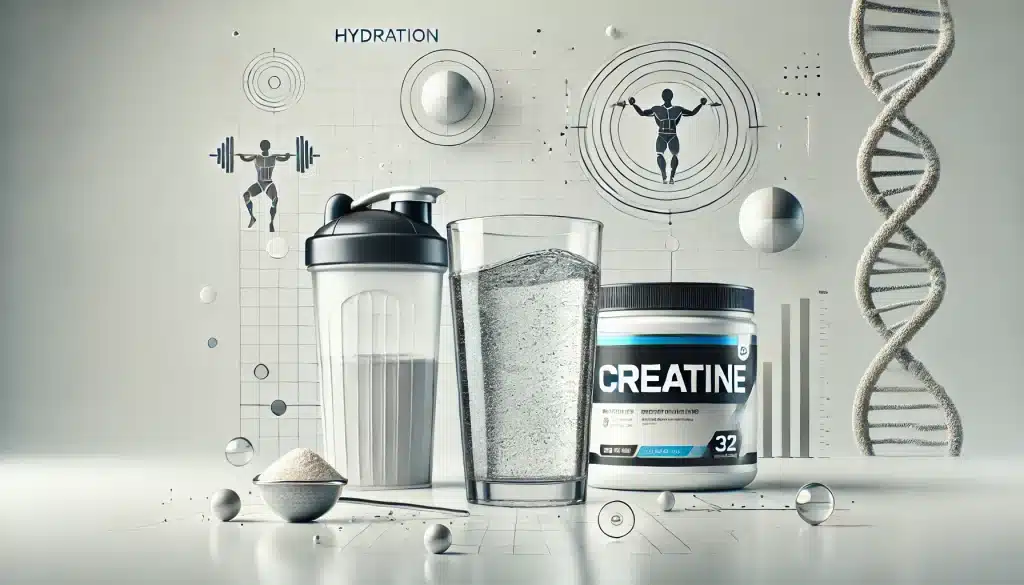
How much water you need will vary and will be based on a few things such as body weight, activity level, climate, and creatine supplement dosage. Here’s a guideline for determining your ideal water intake:
Daily Hydration Needs
The general rule of thumb is to have 30–35 ml of water per kg of body weight per day. For example:
So if you weigh 70 kg, your daily water intake would vary between 2.1 to 2.5 liters.
Drinking Extra Water with Creatine
Creatine needs extra water to absorb and hydrate when you’re taking creatine, so you typically want to add in extra water. This means you should be consuming 500–750 ml of water for every 3–5 g of creatine ( 15 ).
During Exercise
If you do take creatine before or after workouts, just drink more water to account for the water and electrolytes we lose via sweat. Drink 500 ml to 1 liter of water while exercising, based on the intensity and the length of your workout.
Example Water Intake Schedule:
| Time of Day | Water Intake |
|---|---|
| Morning | 500 ml with your first dose of creatine. |
| Pre-Workout | 500 ml 30 minutes before your workout. |
| During Workout | 750 ml to 1 liter of water. |
| Post-Workout | 500 ml with your second dose of creatine. |
| Throughout the Day | The remaining water is spread evenly to meet daily needs. |
The Risks of Inadequate Hydration with Creatine
Failing to consume adequate amounts of water when using creatine can decrease its efficacy as well as cause several side effects.
Here are some of the problems that can be caused by poor hydration:
- Muscle Cramps: Creatine draws water into your muscles and when you’re dehydrated you may experience cramping.
- Bloating and Digestive Discomfort: Creatine without adequate water is capable of causing bloating or stomach upset.
- Reduced Performance: Even mild dehydration can impair physical and mental performance.
- Kidney Stress: Creatine is safe for most, but it can place additional strain on your kidneys if you’re not well-hydrated because they’ll have to work harder to filter out the waste products.
Factors That Affect Water Requirements
The hydration needs vary from person to person and the following are some of the factors for it:
The amount of water you need to drink each day when using creatine or exercising varies from person to person for many reasons. But how about dancer hydration, what factors affect it?
1. Body Weight
It takes more water to keep larger beings hydrated. As a general rule of thumb, you should aim for 30–35 ml of water for every kilogram of body weight in one day.
2. Activity Level
More intense, or longer, workouts mean a greater loss of fluid through sweat, which increases the need for hydration. When you work out, aim to drink an extra 500 ml to 1 liter of water to replace lost sweat.
3. Climate and Environment
In hot or humid climates, the fluid loss rate increases, so one has to drink more water to counter dehydration. Be mindful of your intake depending on the weather, especially when exercising outdoors.
4. Creatine Dosage
More water is needed to manage absorption and decrease the likelihood of dehydration-related side effects in higher doses of creatine (e.g., in a loading phase (20 g/day)). Use 500–750 ml of water per creatine dosage.
5. Dietary Intake
Dietary factors, such as increased protein or sodium intake, can lead to higher water demands due to the increased water required for nutrient metabolism and excretion. Mix hydrating foods with proper water intake into your diet.
6. Sweat Rate
People who sweat more lose greater amounts of fluid and electrolytes, which should be replaced rapidly. It can also help you personalize your hydration plan by monitoring your sweat rate.
7. Health Conditions
Medical conditions such as kidney issues, too much fluid retention, or the use of certain medications might affect the amount of water you need. Talk to your doctor if you have underlying health issues.”
8. Age and Gender
You may need more or less water to hydrate as you age because of higher rates of muscle mass and metabolic rate changes. Someone active will need more water than someone who isn’t, no matter their age.
Why Electrolytes Are Important?
Electrolytes are essential minerals, including sodium, potassium, magnesium, and calcium, that regulate critical bodily functions such as fluid balance, muscle contractions, and nerve signaling.
They play a pivotal role in maintaining hydration by controlling the movement of water in and out of cells, particularly during sweating or intense physical activity. Electrolytes like potassium and calcium support muscle contractions, while magnesium ensures muscles relax properly after exertion.
Additionally, they aid in nerve communication, enabling efficient coordination between the brain and muscles.
During exercise, electrolytes are lost through sweat, and failure to replenish them can lead to dehydration, muscle cramps, fatigue, or even more severe imbalances like hyponatremia (low sodium).
To maintain optimal levels, it’s essential to incorporate electrolyte-rich foods such as bananas, spinach, avocados, and nuts into your diet and consider electrolyte drinks or supplements during intense workouts or hot conditions.
Proper electrolyte balance not only enhances hydration but also supports peak physical performance and overall well-being.
Importance of Electrolytes in Hydration:
The body loses electrolytes in sweat when physically active, particularly during intense exercise. Loss of these minerals can cause imbalances leading to symptoms like muscle weakness, fatigue, cramps, and dehydration.
Studies show that electrolyte consumption after exercise allows for an inordinate replenishment of water & fluid losses because the addition of electrolytes increases the rate of absorption of water, correcting any fluid-electrolyte imbalance resulting from excessive sweating.
Electrolytes and Muscle Function:
Electrolytes are essential for muscle action, including heart rate and muscle contractions. An example of this would be potassium which is known for its vast importance in muscle functionality and dietary potassium is key in maintaining electrolyte balance and hypertension. Potassium-rich foods include bananas, avocados, spinach, and sweet potatoes.
Studies Highlighting the Role of Electrolytes:
- A study published in the Journal of Sports Medicine and Physical Fitness found that fluid ingestion during exercise preserves neuromuscular function by maintaining blood volume and electrolyte balance, ultimately improving endurance performance.
- Research in the journal Nutrients reported that proper electrolyte supplementation can maintain body function, delay the onset of exercise fatigue, and improve exercise performance, as electrolytes are lost along with body water during exercise.
Government Resources on Electrolytes:
You can learn more about the role of electrolytes and how to maintain appropriate hydration from reputable health organizations:
- Hydration and Electrolyte Balancing: CDC Guidelines
- Information about electrolytes and their roles in the body is available at the National Institutes of Health (NIH).
How to Keep Your Electrolytes in Balance:
Electrolyte balance is vital for hydration, muscle function, and general well-being, particularly under the stress of strenuous activity or the supplementation of substances such as creatine. To do this, eat electrolyte-rich foods: bananas, spinach, avocados, and nuts, in addition to taking electrolyte tablets or drinks when working out to better replenish minerals lost through sweating. You should be careful not to overhydrate when drinking too much plain water dilutes important minerals in the body and causes a detrimental disease called hyponatremia. Check the color of your urine to monitor hydration — pale yellow suggests proper hydration levels — and adjust your intake for exercise intensity, climate, and dietary influences.
Practical Tips for Staying Hydrated with Creatine
As creatine can draw water into the muscle cells, remaining adequately hydrated is essential and can also help to bring about the maximum benefits from this supplement. Making smart hydration practices part of your traditional routine will also help reduce the risk of negative side effects, such as digestive issues, to help ensure that creatine is optimally absorbed into the body and to better facilitate improvements in performance and recovery. Some practical tips on how to stay hydrated when you take creatine:
Stagger Your Water Consumption Throughout the Day
Consuming huge quantities of water in one go can overload your system and even result in discomfort. Instead, try to distribute your water consumption more evenly throughout the day. Doing this will provide you with consistent hydration and give your body a chance to absorb and use the water properly.
Water With Every Creatine Dose
When you supplement with creatine at any time (morning, pre-workout, or post-workout), also ensure that you drink at least 500–750 ml of water simultaneously. This allows your muscles to obtain the water required to store and use creatine.
Monitor Your Urine Color
The color of urine is a simple, effective measure of hydration. Light yellow urine means that you are properly hydrated, with darker urine showing that you should drink more. Use this to help guide your hydration throughout the day, increasing or decreasing your water intake as needed.
Stay Ahead of Thirst
Thirst is frequently an indication that your body is already a little dehydrated. Drink water before you feel thirsty. Instead, always have a water bottle within reach and sip small amounts frequently to ensure proper hydration.
Drink More Water While Exercising
Sweating comes with vigorous physical activity, resulting in considerable fluid loss. Especially if you have taken creatine before, you must drink 750 ml to 1 liter of water during your workout. During exercise, use a marked water bottle so you can keep track of how much you are drinking.
Differentiate based on the Environmental Set
Sweat loss is greater in hot or humid climates and therefore more water is needed to be hydrated. If you train outdoors or in high heat, increase your water consumption proportionately to avoid dehydration.
Incorporate Electrolytes
Although water is essential, electrolytes, such as sodium potassium, and magnesium, also significantly affect fluid balance. During high-intensity workouts, try adding electrolyte tablets or drinks to your routine to replace what is lost in sweat.
Use Hydration-Tracking Tools
Apps such as WaterMinder or MyFitnessPal help track your daily water consumption. They send alerts for water consumption, a precise display of your hydration behavior, tracking and helping you reach goals every day.
Fiddling with hydration at loading phases
If you have a creatine loading phase (often 20 g/day divided into four doses), then your need for water will be more than the maintenance phase. During this period, drink an extra 1–1.5 liters of water each day to help accommodate the increase in creatine.
Incorporate Hydrating Foods
Many foods also help you to remain hydrated: watermelon, cucumbers, oranges, and strawberries have high water content and can help you along the way. These will serve to add to your overall water intake.
Drink Water Before You Sleep (But Not Too Much)
Making a habit of drinking a moderate amount of water (200–300 ml) before bed helps you fight overnight dehydration. But do not drink too much right before bed, as you will need to urinate and it will disturb your sleep.
Consider Drinking More, if Activity is Intense
On rest or low-activity days, you may need less water than you do on high-intensity workout days. Your activity level will determine how much you should consume, so account for this in your intake to keep your body well hydrated, but not overwhelmed.
Summary: How Much Water Do You Need with Creatine?
| Scenario | Water Recommendation |
|---|---|
| Daily Hydration | 30–35 ml of water per kg of body weight. |
| With Each Creatine Dose | 500–750 ml per 3–5 g of creatine. |
| During Workouts | 500 ml to 1 liter of water to replace fluids lost through sweat. |
| During Creatine Loading | At least 1 liter more than your usual daily water intake. |
Additional Insight: Timing Matters for Hydration
For maximizing the effectiveness of creatine and supporting overall performance, timing is crucial when hydrating while taking creatine.
You may ask, why should you drink water 30 minutes before taking creatine? Hydration during workouts replenishes fluids lost through sweat, sustains energy levels, and improves endurance.
Drinking water with creatine during the anabolic window post-workout assists with nutrient transport, muscle recovery, and reducing fatigue.
This ensures that your muscle can replenish ATP with creatine while preventing cramps or discomfort often associated with dehydration. This can help ensure that you reap the full benefits of your creatine supplementation while also encouraging your body’s performance and recovery needs.
Frequently Asked Questions (FAQs):
Can you drink too much water with creatine?
Yes, excessive water can dilute electrolytes, potentially causing muscle weakness or fatigue.
Do you need to drink water with creatine capsules?
Absolutely. Whether in powder or capsule form, creatine requires adequate hydration to work effectively.
What happens if you don’t drink enough water with creatine?
You may experience reduced absorption, muscle cramps, or bloating. It may also decrease creatine’s effectiveness.
How much water is needed during a loading phase?
During a loading phase (20 g/day), aim to drink at least 1 liter more than your normal daily hydration needs.
Can I drink sports drinks instead of water?
Yes, sports drinks can be beneficial as they provide electrolytes, but they shouldn’t replace all your water intake.
Does Creatine Make You Thirsty?
Yes, creatine can make you thirsty. It draws water into muscle cells, which may raise hydration requirements. Drinking more water can counteract this effect.
Conclusion: Hydration is Key to Maximizing Creatine’s Benefits
Proper hydration is non-negotiable if you want to get the best results from creatine supplementation. Strive for 30–35 ml of water per kg of body weight per day and add 500–750 ml extra for each dose of creatine. For a loading phase or anything intense, then increase accordingly.
Remember to balance fluids with electrolytes for optimal hydration and muscular performance. By incorporating these strategies, you will increase creatine’s benefits to optimally hit your fitness goals.
